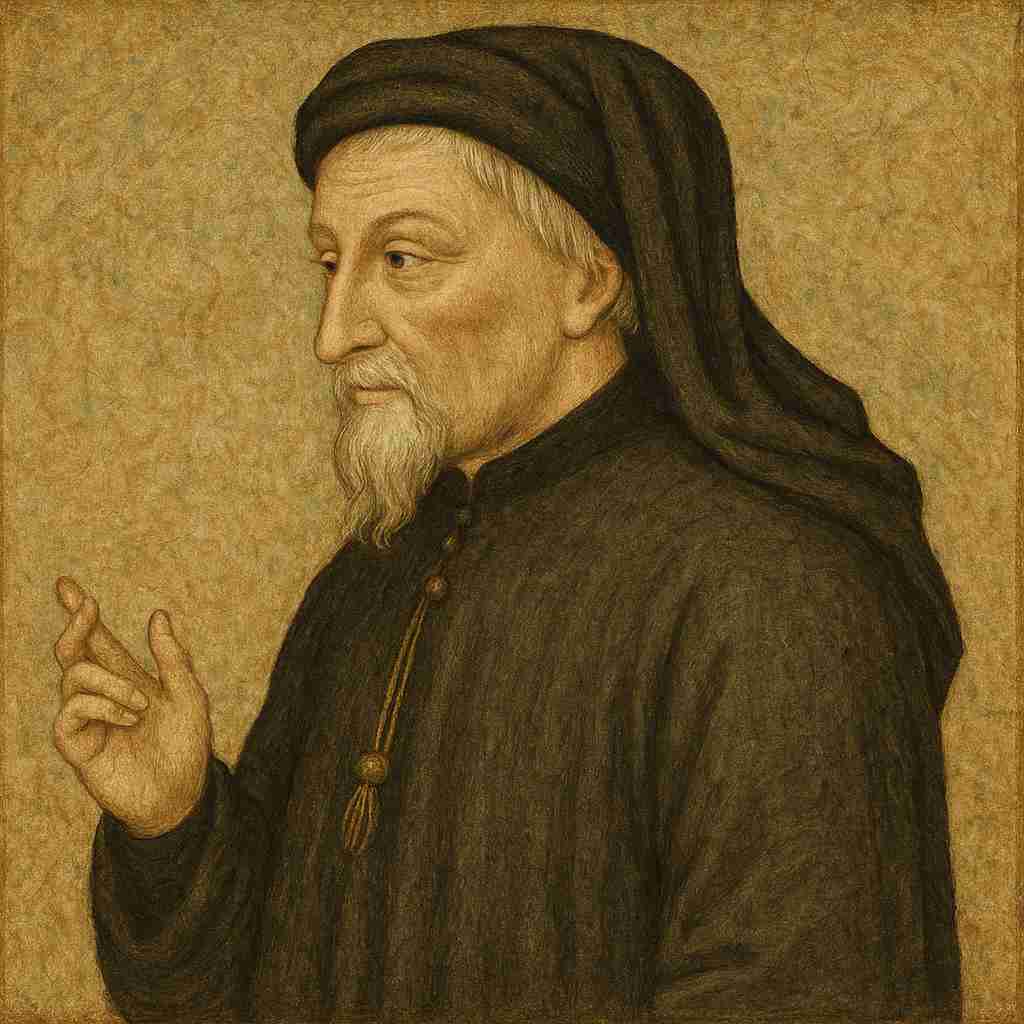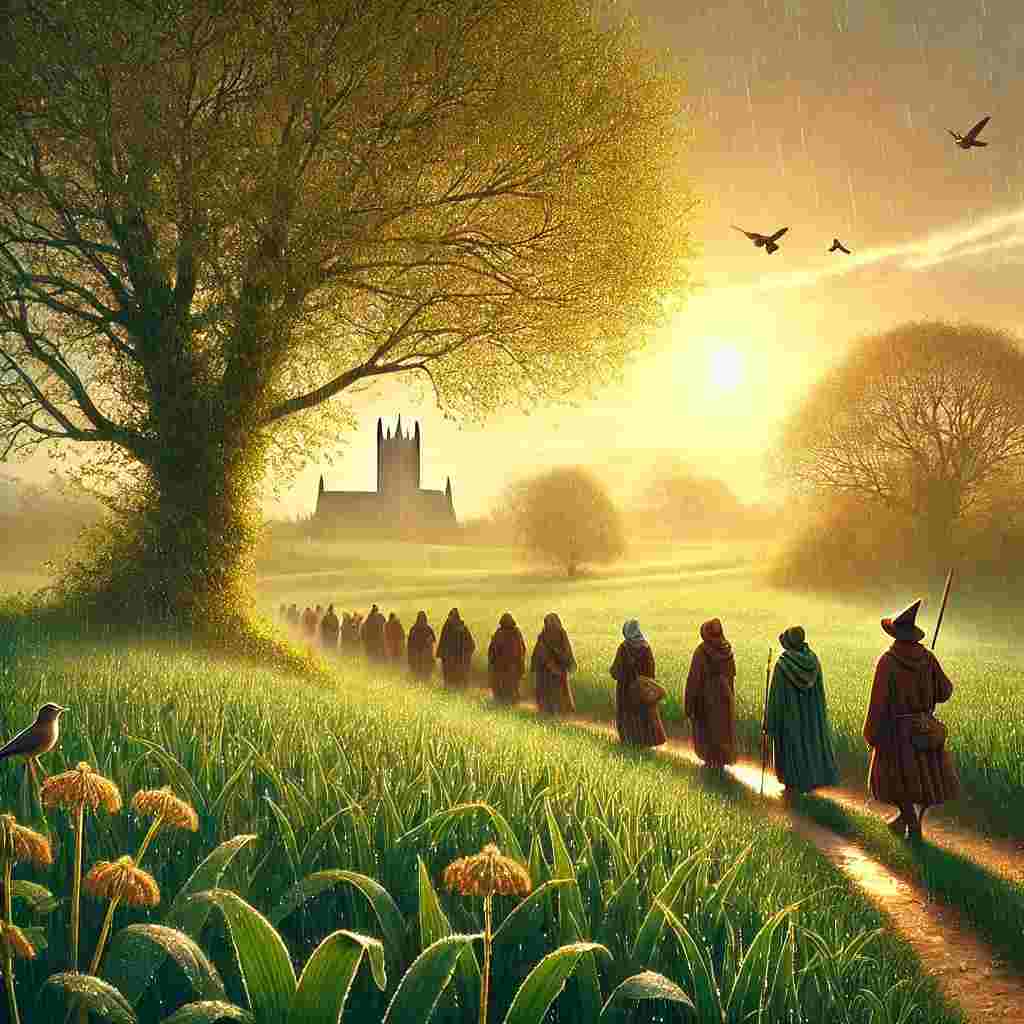1 Poems by Geoffrey Chaucer
c.1343 - 1400
Geoffrey Chaucer Biography
Geoffrey Chaucer, often regarded as the "Father of English Literature," occupies a foundational place in the literary canon of the English-speaking world. Born in London around 1343, Chaucer’s life and works straddle the late Middle Ages, a period marked by profound cultural, social, and political changes. As a poet, civil servant, diplomat, and scholar, Chaucer's achievements were shaped by his times, yet they transcended them, leaving an indelible mark on English letters. His most celebrated work, The Canterbury Tales, is not merely a cornerstone of English literature but a vibrant portrait of medieval society, teeming with the complexities, humor, and pathos of human life.
The details of Chaucer's early life are somewhat obscured by history, but it is widely accepted that he was born into a family of wine merchants, a comfortable middle-class background that afforded him access to education and opportunity. He likely received a solid grounding in Latin, rhetoric, and the classics, perhaps at the grammar school of St. Paul’s Cathedral in London. This early exposure to classical and contemporary texts sowed the seeds for his later literary achievements.
Chaucer’s adolescence brought him into contact with the royal court, where he served as a page in the household of Elizabeth de Burgh, Countess of Ulster. This role introduced him to aristocratic culture, courtly manners, and the literary forms that were flourishing among the nobility. During this period, Chaucer may have encountered the works of French poets such as Guillaume de Machaut, whose elegant lyricism and themes of courtly love resonated deeply with his own burgeoning literary inclinations.
By 1359, Chaucer had entered military service, joining Edward III’s campaign in the Hundred Years' War. Captured during the siege of Reims, he was ransomed for a considerable sum—testimony to his value to the English crown. This experience, while seemingly tangential, likely deepened Chaucer’s appreciation for the complexities of human ambition, conflict, and frailty, themes he would later explore in his poetry.
After his return to England, Chaucer embarked on a career in civil service, which would prove pivotal to his intellectual and creative development. Over the years, he held a series of positions that brought him into contact with diverse strata of society. As a customs official, he encountered merchants, sailors, and artisans. As a diplomat, he traveled extensively to France, Italy, and possibly Spain, where he absorbed the literary and intellectual currents of continental Europe. These journeys exposed him to the works of Dante, Petrarch, and Boccaccio, whose innovative use of vernacular language and exploration of human psychology had a profound impact on Chaucer's own literary vision.
Chaucer’s early poetic works reflect his immersion in the courtly culture and literary traditions of his time. The Book of the Duchess, an elegy written around 1369, mourns the death of Blanche, Duchess of Lancaster, and showcases Chaucer’s ability to blend classical allusions, dream vision conventions, and emotional depth. This work, while indebted to French poetic models, reveals an emerging voice that is distinctly Chaucerian in its warmth, wit, and keen observation.
During the 1370s and 1380s, Chaucer’s literary ambitions expanded alongside his professional responsibilities. He served as Comptroller of Customs for the Port of London, a role that immersed him in the bustling mercantile world of the city. This period also saw the composition of The House of Fame and The Parliament of Fowls, both of which explore the nature of love, fame, and human aspiration within the framework of allegorical dream visions. These works are notable for their playful, questioning tone and their rich intertextuality, as Chaucer engages with classical and contemporary sources while carving out a space for his own distinctive perspective.
Perhaps the most significant development in Chaucer’s literary evolution occurred during his visits to Italy, where he encountered the works of Dante Alighieri, Giovanni Boccaccio, and Francesco Petrarch. The influence of these Italian writers is evident in Troilus and Criseyde, a narrative poem written in the early 1380s. Based on a story from Boccaccio’s Il Filostrato, Chaucer’s version transforms the tale of love and betrayal into a complex exploration of fate, free will, and the human condition. The poem’s nuanced characterizations, psychological depth, and tragic grandeur mark it as one of Chaucer’s greatest achievements and a masterpiece of Middle English literature.
By the late 1380s, Chaucer had begun work on his magnum opus, The Canterbury Tales. Conceived as a collection of stories told by a diverse group of pilgrims traveling to the shrine of Saint Thomas Becket in Canterbury, the work offers a panoramic view of 14th-century English society. Through its vivid cast of characters—the bawdy Wife of Bath, the virtuous Parson, the scheming Pardoner, and many others—Chaucer captures the complexities and contradictions of human nature with unparalleled insight and empathy.
The structure of The Canterbury Tales reflects Chaucer’s deep engagement with a variety of literary traditions, from courtly romance and fabliau to hagiography and moral allegory. Yet what sets the work apart is its remarkable realism and vitality. Chaucer’s pilgrims speak in voices that are distinctly their own, their tales shaped by their social backgrounds, personal experiences, and moral perspectives. The interplay between the pilgrims and their stories creates a rich tapestry of themes, from the nature of love and marriage to the corrupting influence of greed and the redemptive power of faith.
Chaucer’s use of the English vernacular in The Canterbury Tales was revolutionary for its time. While Latin and French dominated the literary and scholarly realms, Chaucer’s choice to write in Middle English elevated the status of the language and laid the groundwork for its literary flourishing in the centuries to come. His dexterous use of meter, rhyme, and vocabulary demonstrated the expressive potential of English and set a standard for subsequent generations of poets.
The final years of Chaucer’s life were marked by both professional setbacks and artistic triumphs. Political upheaval, including the deposition of Richard II in 1399, likely disrupted his career, and there is evidence that he faced financial difficulties. Nevertheless, he continued to write and revise his works until his death in 1400. He was buried in Westminster Abbey, where his tomb became the first in what is now known as Poets’ Corner—a fitting tribute to the man who had done so much to shape the course of English literature.
Chaucer’s legacy is vast and enduring. As a poet, he was a master storyteller, a keen observer of human nature, and a pioneer of literary innovation. His works reflect a deep engagement with the intellectual and cultural currents of his time, yet they transcend their historical context to speak to universal themes and experiences. For readers and writers alike, Chaucer remains a source of inspiration, his voice as vibrant and relevant today as it was over six centuries ago. Through his words, the medieval world comes alive, and we are reminded of the enduring power of literature to illuminate the human condition.
This text was generated by AI and is for reference only. Learn more
Username Information
No username is open
Everything is free to use, but donations are always appreciated.
Quick Links
© 2024-2025 R.I.Chalmers (V2Melody).

All music on this site by R.I.Chalmers (V2Melody) is licensed under a Creative Commons Attribution-NonCommercial 4.0 International License.
Attribution Requirement:
When using this music, you must give appropriate credit by including the following statement (or equivalent) wherever the music is used or credited:
"Music by R.I.Chalmers (V2Melody) – https://v2melody.com"
Support My Work:
If you enjoy this music and would like to support future creations, your thanks are always welcome but never required.
Thanks!


